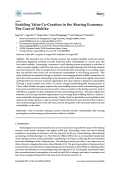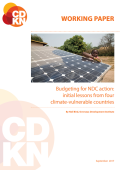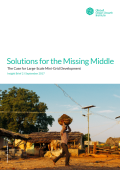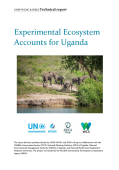
The disruptive rise of the sharing economy has inspired multiple social innovations embodying significant potential towards achieving urban sustainability in crucial areas like low-carbon mobility. Increasingly, consumers in such sharing systems participate in activities of value co-creation together with firms and peers, such as through enforcing rules that help maintain trust and reciprocity. Why do people choose to invest their time and energy in co-creating values that may benefit wider social and environmental sustainability in the sharing economy?

The working paper Budgeting for NDC Action – Initial Lessons from Climate-Vulnerable Countries addresses the following question: are climate change-related expenditures starting to appear in national budgets to secure the early implementation of countries’ Nationally Determined Contributions (NDCs)?

This Insight Brief Solutions for the Missing Middle: The Case for Large-Scale Mini-Grid Development demonstrates how mini grids powered by solar photovoltaics (PV) and energy storage systems (ESS) can provide energy access to 800 million people who do not live near a centralized electric grid.

The report The Land‑Water‑Energy Nexus: Biophysical and Economic Consequences addresses the following question: What would be the global and regional biophysical and economic consequences by 2060 because of policy inaction regarding the limited availability of land, water and energy, given their interlinkages?

The experimental ecosystem accounts for Uganda presented in this report follow on from a recent publication which explored approaches to accounting for species-level biodiversity and a feasibility study of applications using existing data in Uganda. The accounts compiled respond to policy entry points for biodiversity and ecosystem related concerns in Uganda.
